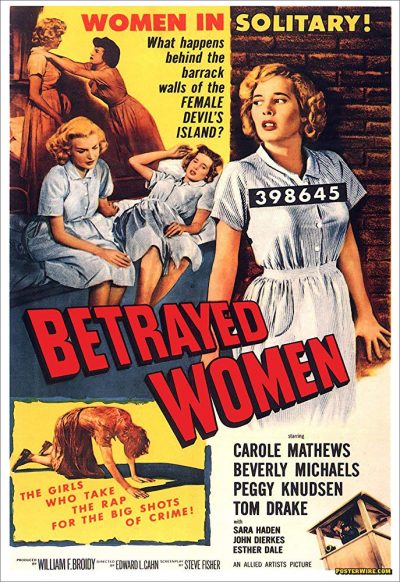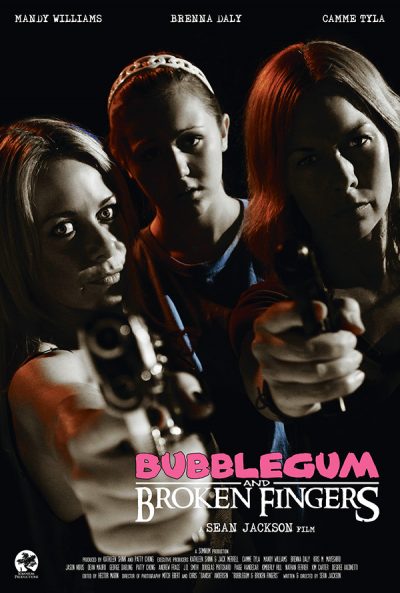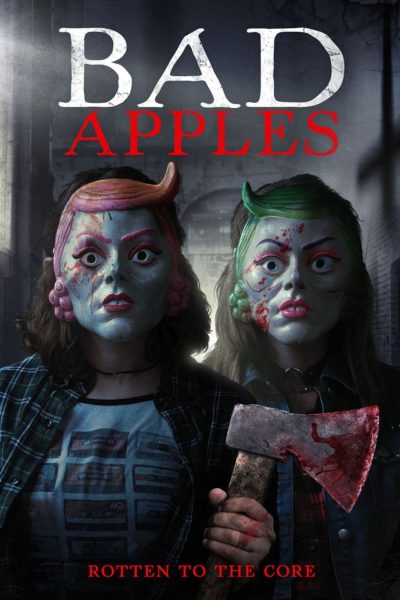★★★
“Japan Chainsaw Mascara.”
 A solid enough entry in the Jap-splat genre, this benefits mostly from a winning central performance from Uchida as the title character, Giko Nokomura. Her family are in the demolition business, which is at least a token gesture towards explaining the F-sized chainsaw she carries everywhere – initially in a guitar case! She’s a bit of a delinquent, harking back to the sukeban movies of the sixties like Terrifying Girls’ High School: Lynch Law Classroom, and with some resemblance to Meiko Kaji, in attitude more than anything. Despite her bad girl credentials, she does want to graduate (there’s a speech later on about how delinquents actually love their schools, and the identity it gives them), and on this summer day, is going back to the otherwise largely-deserted educational establishment, to re-take a missed test.
A solid enough entry in the Jap-splat genre, this benefits mostly from a winning central performance from Uchida as the title character, Giko Nokomura. Her family are in the demolition business, which is at least a token gesture towards explaining the F-sized chainsaw she carries everywhere – initially in a guitar case! She’s a bit of a delinquent, harking back to the sukeban movies of the sixties like Terrifying Girls’ High School: Lynch Law Classroom, and with some resemblance to Meiko Kaji, in attitude more than anything. Despite her bad girl credentials, she does want to graduate (there’s a speech later on about how delinquents actually love their schools, and the identity it gives them), and on this summer day, is going back to the otherwise largely-deserted educational establishment, to re-take a missed test.
Of course, it’s never that simple, is it. For pitted against her is her nemesis, Nero Aoi (Yamachi), plus the army of cyborg students created by this wannabe mad scientist. She started off by kidnapping and working on pets, but now has a lethal array of “enhanced” humans at her disposal, such as “Whole-Body Bomber” and former cheerleader Sayuri Bakutani (Sato). Nero is intent on taking her revenge on Giko, following a perceived slight which the latter has long forgotten. Even before she has arrived at school for the exam, Giko is under attack by the first three of these, including a girl with a rocket-launcher embedded in… a most unusual part of her body. Let’s just say, reloading is fun.
Based on the manga series Chimamire Sukeban Chainsaw, by Rei Mikamoto, it has the fast-and-loose sensibility you’d expect, with things taking place for little or no reason other than the maker thought it’d be entertaining. Sometimes they are correct, other times… not so much. There seem to be flashbacks every three minutes, explaining how everyone got to where they are, and it alternates between scenes that go on beyond their merit or purpose, and ones which feel too short. The low-budget is often palpable, falling well short of being able to deliver what is asked of it, and the blood is more digital than physical.
Despite these flaws, I was entertained, though obviously, those of delicate sensibilities should stay well away. Uchida has an appropriate range of expressions for the situations in which Giko finds herself – “deadpan astonishment” is probably the main one which gets used. There’s a dry sense of humour in concepts like the school having a Ninja Club, such as them still deferring obsequiously to the jocks). When Giko meets the president of Shop Club, who is also about its only un-cyborged member, her chainsaw gets some power-ups (“Extending Chainsaw”), though it still proves no match for Nero’s “Chainsaw of the Dead”. Actually, how you react to that sentence will likely determine whether or not you’ll enjoy this. Personally, if a little short of the best entries in this strange little genre, I still found plenty here to appreciate.
Dir: Hiroki Yamaguchi
Star: Rio Uchida, Mari Yamachi, Seira Sato, Yuki Tamaki





 Erica (Kriis) is an attractive con-artist, who seduces married men in hotels, then drugs and robs them, knowing they’ll never be able to report the crime. She has just brought on an apprentice, Lauren (Patrikios), to learn the dubious trade, watch her back, etc. Their next score turns out to be the jackpot. as they discover the target was carrying a stash of diamonds with a seven-figure value. Absconding with their ill-gotten gains, the pair decide to lay low for a while, and head to Erica’s hideout on the holiday destination of Isabelle Island. They’re disturbed to read news reports that the target turned up dead in the room, and it quickly appears that the owner of the diamonds is closing in on them. But who is the threat? Local policeman, Mike (McCullough), for whom Lauren has a thing? Visiting boat-owner and part-time magician Tom (Berdini), with whom Erica has a fling? Or the creepy bald guy who arrives on the island and appears to be stalking Erica?
Erica (Kriis) is an attractive con-artist, who seduces married men in hotels, then drugs and robs them, knowing they’ll never be able to report the crime. She has just brought on an apprentice, Lauren (Patrikios), to learn the dubious trade, watch her back, etc. Their next score turns out to be the jackpot. as they discover the target was carrying a stash of diamonds with a seven-figure value. Absconding with their ill-gotten gains, the pair decide to lay low for a while, and head to Erica’s hideout on the holiday destination of Isabelle Island. They’re disturbed to read news reports that the target turned up dead in the room, and it quickly appears that the owner of the diamonds is closing in on them. But who is the threat? Local policeman, Mike (McCullough), for whom Lauren has a thing? Visiting boat-owner and part-time magician Tom (Berdini), with whom Erica has a fling? Or the creepy bald guy who arrives on the island and appears to be stalking Erica? Seventeen-year-old Sarah Fairchild and her family have become persona non grata after her father’s execution by the Algardis Empire. He was a renowned fighter and commander, so his alleged desertion makes no sense to Sarah. Regardless, his wife and daughter are now pariahs to the local community. Even with Sarah’s unparalleled fighting skills, both natural and magical, her employment opportunities are limited, to say the least.
Seventeen-year-old Sarah Fairchild and her family have become persona non grata after her father’s execution by the Algardis Empire. He was a renowned fighter and commander, so his alleged desertion makes no sense to Sarah. Regardless, his wife and daughter are now pariahs to the local community. Even with Sarah’s unparalleled fighting skills, both natural and magical, her employment opportunities are limited, to say the least. Wannabe actress Rosa (de Armas) is on the way home from her job as a hotel maid when she gets a message telling her she has a call-back the next day for a final audition. With her washing machine broken, she pops into the local 24-hour laundromat to get her costume all spick and span. It and the surrounding streets are completely deserted, and it’s not long before she’s being menaced by the kind of hulking, silent figure only found in horror movies like this. She’s delighted when hunky co-launderer Gabriel (Cadavid) shows up to rescue her, despite his strange tastes in music. But is he really as nice as he seems?
Wannabe actress Rosa (de Armas) is on the way home from her job as a hotel maid when she gets a message telling her she has a call-back the next day for a final audition. With her washing machine broken, she pops into the local 24-hour laundromat to get her costume all spick and span. It and the surrounding streets are completely deserted, and it’s not long before she’s being menaced by the kind of hulking, silent figure only found in horror movies like this. She’s delighted when hunky co-launderer Gabriel (Cadavid) shows up to rescue her, despite his strange tastes in music. But is he really as nice as he seems? First, let me just say: that poster is a true work of art. Seriously, how can anyone look at that and
First, let me just say: that poster is a true work of art. Seriously, how can anyone look at that and  There is entertainment value to be found even in bad movies. Bad action, horror and SF are sometimes just as amusing as the good stuff. But bad comedy is almost irredeemable: that’s why Mystery Science Theater 3000 rarely go there. Bad comedy just… sits there, dull and unamusing, almost worthless. And that’s what we have here. It’s a somewhat interesting idea, with some potential. Unfortunately, the execution – mostly in the script and direction – are so woefully inept that even the brave efforts of Florence Henderson, in her final film, aren’t enough to salvage it. And wasting the talents of Pam Grier needs to be some kind of cinematic capital offense.
There is entertainment value to be found even in bad movies. Bad action, horror and SF are sometimes just as amusing as the good stuff. But bad comedy is almost irredeemable: that’s why Mystery Science Theater 3000 rarely go there. Bad comedy just… sits there, dull and unamusing, almost worthless. And that’s what we have here. It’s a somewhat interesting idea, with some potential. Unfortunately, the execution – mostly in the script and direction – are so woefully inept that even the brave efforts of Florence Henderson, in her final film, aren’t enough to salvage it. And wasting the talents of Pam Grier needs to be some kind of cinematic capital offense. Akemi Tachibana (Kaji) is second in command of her yakuza gang. During a battle with another group, she accidentally blinds Aiko Gouda (Tokuda), the sister of an enemy – an incident Akemi believes leaves her cursed, after a black cat laps up the blood spilled as a result. Following three years in jail, she returns to find the clan on the verge of war against their rivals, the Dobashi group. Various members of the Tachibanas are turning up dead, and with their tattoos flayed off. Turns out that Gouda has joined the Dobashi gang, with the aim of extracting vengeance on the woman who took her sight, even though Akemi has borne the guilt of that event ever since.
Akemi Tachibana (Kaji) is second in command of her yakuza gang. During a battle with another group, she accidentally blinds Aiko Gouda (Tokuda), the sister of an enemy – an incident Akemi believes leaves her cursed, after a black cat laps up the blood spilled as a result. Following three years in jail, she returns to find the clan on the verge of war against their rivals, the Dobashi group. Various members of the Tachibanas are turning up dead, and with their tattoos flayed off. Turns out that Gouda has joined the Dobashi gang, with the aim of extracting vengeance on the woman who took her sight, even though Akemi has borne the guilt of that event ever since.  Outside of Kill Bill, I’ve never been a fan of Quentin Tarantino. But this film did give me some appreciation for him. Because it’s only when you see Tarantino done badly, that you realize the aspects he does well. It undeniably takes some skills to keep a story-line involving multiple sets of characters in the air, especially when centered on a Macguffin like a suitcase whose contents are never revealed. Jackson tries to do exactly the same thing here, and the result is, frankly, a mess, where you’re left caring little or nothing about any of the participants.
Outside of Kill Bill, I’ve never been a fan of Quentin Tarantino. But this film did give me some appreciation for him. Because it’s only when you see Tarantino done badly, that you realize the aspects he does well. It undeniably takes some skills to keep a story-line involving multiple sets of characters in the air, especially when centered on a Macguffin like a suitcase whose contents are never revealed. Jackson tries to do exactly the same thing here, and the result is, frankly, a mess, where you’re left caring little or nothing about any of the participants. Ineptly constructed on just about every level, this proves that stealing from better movies – most obviously, Halloween and The Strangers – is not a guaranteed recipe for success. Teacher Ella (Grant) is has just moved into a new home with her husband, Robert (Skipper), who works at the local hospital. Left alone in the house on Halloween night – that whirring sounds are my eyes rolling – Ella becomes the target for two young girls (Prichard + Collins) in masks, whose unfortunate pre-natal experience has apparently left them with severely psychotic tendencies. Or so we are left to presume, for the bulk of what follows.
Ineptly constructed on just about every level, this proves that stealing from better movies – most obviously, Halloween and The Strangers – is not a guaranteed recipe for success. Teacher Ella (Grant) is has just moved into a new home with her husband, Robert (Skipper), who works at the local hospital. Left alone in the house on Halloween night – that whirring sounds are my eyes rolling – Ella becomes the target for two young girls (Prichard + Collins) in masks, whose unfortunate pre-natal experience has apparently left them with severely psychotic tendencies. Or so we are left to presume, for the bulk of what follows. It took me about six years after reading the series opener to get back to the adventures of one of my favorite action heroines, Seeley James’ Pia Sabel; but I only wish I’d done so a lot sooner! Some of my comments in my
It took me about six years after reading the series opener to get back to the adventures of one of my favorite action heroines, Seeley James’ Pia Sabel; but I only wish I’d done so a lot sooner! Some of my comments in my